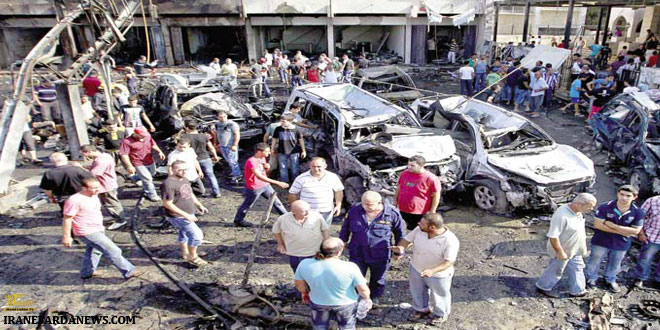
by:Mohamed Kawas
Indictment reveals that Lebanese politics is no longer politically suspect, as was the case in 2005 assassination of former PM Rafik Hariri.
BEIRUT – Lebanon’s political forces said they were not surprised by the indictment issued by the country’s judicial authorities over the bombings at Al-Taqwa and Al- Salam mosques in Tripoli in August 2013.
The 44-page indictment issued September 2nd by a Lebanese military court listed a host of figures but explicitly named two Syrian intelligence officers and the organisations they worked for as being responsible for the attacks in which 45 people were killed.
This is not the first time that Syrian intelligence agencies have been implicated in a terrorist attack against civilians in Lebanon. Nobody was surprised by the news, least of all Lebanon’s politicians. Whether they are allies or opponents of Syrian President Bashar Assad’s regime, they would be well aware of the country’s involvement in terrorist attacks in Lebanon.
Despite this historic indictment, the Hezbollah-led March 8 alliance, which is allied with Damascus, did not issue a statement or response about those who have been accused as responsible for the deadliest terrorist attack since Lebanon’s civil war.
Hezbollah, which is a member of the government that oversaw the investigation and subsequent indictments, did not seem at all interested in issuing any statement bringing the Syrian regime, which it has so often defended, to task. Its defence of Damascus has gone beyond mere rhetoric and Hezbollah has deployed fighters to fight alongside Assad forces in Syria.
Even though this attack must be considered a foreign one on Lebanon and therefore an act of war, the Lebanese government did not take the expected actions that any country might take under such circumstances.
Twenty-two people, including members of Syrian intelligence and local proxies, were indicted related to the attack. If found guilty, they could be sentenced to death.
The indictment reveals that Lebanese politics is no longer politically suspect, as was the case in the 2005 assassination of former prime minister Rafik Hariri. It is true that the Special Tribunal for Lebanon, which is investigating that crime, issued indictments claiming Hezbollah members were involved in the assassination but it was easy for Hezbollah and its allies to claim that the court was politicised and had a “suspicious agenda” against the “resistance”.
The indictment into the 2013 bombings in Tripoli, however, was issued by a court that is part of Lebanon’s judicial system, which is operating under the authority of Lebanon’s government — a point that must be embarrassing for Hezbollah and others defending Assad. “The era of Syrian tutelage is gone and will not return and threats from the Syrian regime will not scare us,” Lebanese Justice Minister Ashraf Rifi, a strong critic of Damascus, proclaimed.
The text of the indictment reveals that the investigation was carried out by the information division of Lebanon’s Internal Security Forces and explicitly implicates members of the Syrian regime. The report added that investigations were continuing to uncover which Syrian officials ordered the attacks, adding that “the order was issued from a high-level security body within the Syrian intelligence service”.
While the identities of the Syrian officials who ordered the bombings are yet to be revealed, the Syrian intelligence agents who allegedly carried out the orders were named: Muhammad Ali Ali, also known as Abu Jassim, of the Palestinian Branch affiliated with the Military Intelligence Directorate and Nasser Jubaan of the Political Security Directorate.
The indictment named another Syrian, Khadr Al-Ayruni, a suspected member of Syrian intelligence, who is known to have bought the vehicles used in the bombings and taken them across the border to Syria where they were loaded with explosives.
The man alleged to be the ringleader of the attacks was a Lebanese citizen, Yousef Diab, a religious figure who studied at a Jabal Mohsen mosque.
The indictment also dealt with the role played by Lebanon’s Alawite-led Arab Democratic Party, which was founded by Ali Eid in 1974 and is currently led by his son Rifaat Eid. According to the investigation, Ali Eid is accused of smuggling Al-Fatwa mosque bomber Ahmed Marei out of the country. He was summoned for questioning a number of times by the investigators and eventually fled to Syria, where his death was announced in December 2015.
The biggest threat from this terrorist attack was that it came against the backdrop of sectarian tensions between Lebanon’s Sunni and Alawite communities, not least the Bab Al-Tabbaneh- Jabal Mohsen conflict, which militias affiliated to the Arab Democratic Party played a major role in. The indictment reveals that senior figures of the party were embroiled in the Tripoli bombings, which exacerbated sectarian tensions in the city.
Despite this, there was no condemnation from the March 8 alliance or Hezbollah.
However, Tripoli-native Youth and Sports Minister Faisal Karami, son of former prime minister Omar Karami, and a politician with close ties to Damascus, expressed shock that “those we considered brothers” were involved in the attack.
On the other hand, Rifi, who is known for his strong stances against Damascus and its allies in Lebanon, and also from Tripoli, called for the expulsion of Syria’s ambassador to Lebanon, the dissolution of the Arab Democratic Party and for Beirut to make a formal complaint against Damascus at the UN Security Council.
 khalijefars News, Blogs, Art and Community
khalijefars News, Blogs, Art and Community








